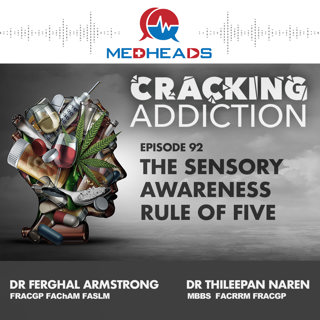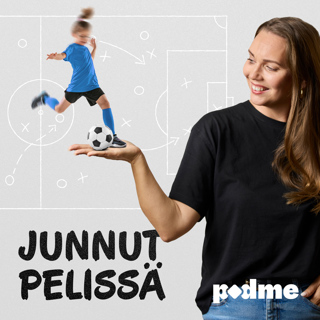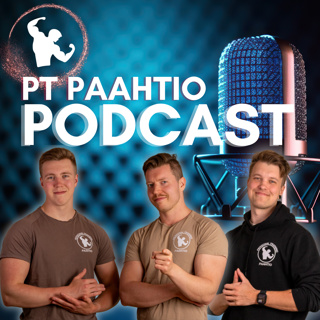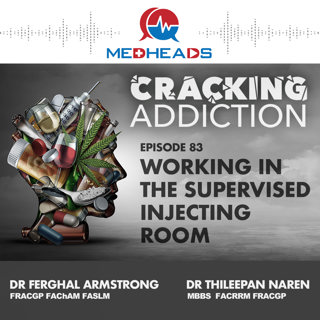
Working with Colleagues in the Grip of Addiction
Join us in this episode as we hear from Dr. Tony Weeks, a former Director of Anaesthesia at Alfred Health, as he shares his experiences in treating doctors with addiction and working in a medically supervised injecting room. Dr. Weeks speaks candidly about the challenges of helping colleagues with substance use disorders, and the complexities of treating doctors who are also struggling with addiction.After retiring from his work as an anesthetist, Dr. Weeks volunteered at a drug consumption room in North Richmond, Melbourne, where he helped patients find veins to inject into, assisted those who overdosed, and provided opioid substitution therapy. Through his vast and varied career, Dr. Weeks has seen firsthand the life-saving work that takes place in drug consumption rooms. He shares his insights on the evidence-based nature of harm reduction interventions, such as drug consumption rooms, and the importance of treating addiction as a public health issue.Don't miss this thought-provoking conversation with Dr. Tony Weeks, where he sheds light on the challenges and rewards of helping those struggling with addiction, including colleagues and fellow doctors.Discussions and comments in our videos are for informational purposes only and should not replace the advice of your medical professional. Please consult with your doctor before making any changes to your medical treatment or lifestyle.Latest Blogshttps://www.meducate.com.au/blogAbout Meducate ®Meducate provides online education for doctors, clinicians, health professionals and the public.See the website to browse the many different talks and courses available https://www.meducate.com.au
15 Maalis 202341min
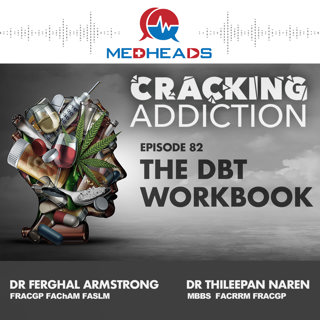
The DBT Workbook for Alcohol and Drug Addiction
This week on Cracking Addiction we talk with Psycologist and Author Dr Laura Petracek.We explore the principles of Dialectical Behavior Therapy (DBT) and how they can be applied to the 12 Steps of addiction recovery.Recovering from addiction and managing a mental illness can be challenging and often feels like they take over your life. However, with the right tools and strategies, you can regulate your emotions, develop self-management skills, reduce anxiety and stress, and feel like yourself again.DBT is a type of talking therapy that is specifically tailored to individuals who feel emotions very intensely. Her workbook takes the skills and strategies drawn from DBT and applies them to each of the 12 Steps of addiction recovery. This new roadmap helps reduce emotional distress symptoms, supports sobriety, and promotes overall mental health.By exploring the connection between DBT and the 12 Steps, this workbook equips you with the tools to manage your emotions and navigate your journey to recovery. If you're looking for a practical and effective approach to manage your mental health while recovering from addiction, this workbook is the perfect resource for you.Discussions and comments in our videos are for informational purposes only and should not replace the advice of a qualified medical professional. Please consult with your doctor before making any changes to your medical treatment or lifestyle.Discussions and comments in our videos are for informational purposes only and should not replace the advice of your medical professional. Please consult with your doctor before making any changes to your medical treatment or lifestyle.Latest Blogshttps://www.meducate.com.au/blogAbout Meducate ®Meducate provides online education for doctors, clinicians, health professionals and the public.See the website to browse the many different talks and courses available https://www.meducate.com.au
8 Maalis 202330min
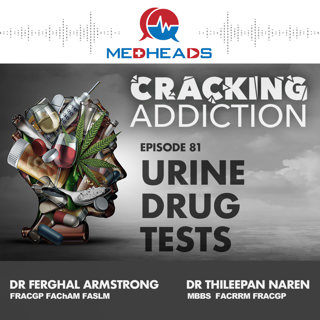
Overcoming Patient Stigma in Urine Drug Testing
Join us in this informative episode as we dive into the topic of urine drug tests in Addiction Medicine. We will discuss the purpose and importance of these tests and the circumstances in which they are performed. We will also touch on the key indications that may lead to a urine drug screen being administered during addiction treatment.Patients can often have concerns and feel stigma surrounding urine drug testing. We will address these issues and offer ways to mitigate any negative feelings that may arise. Additionally, we will provide guidance on how to interpret the results of a urine drug screen, including what they mean and what actions can be taken based on the results.Whether you are a healthcare provider, a patient, or simply curious about this topic, this show is a must-listen.Discussions and comments in our videos are for informational purposes only and should not replace the advice of your medical professional. Please consult with your doctor before making any changes to your medical treatment or lifestyle.Latest Blogshttps://www.meducate.com.au/blogAbout Meducate ®Meducate provides online education for doctors, clinicians, health professionals and the public.See the website to browse the many different talks and courses available https://www.meducate.com.au
1 Maalis 202318min
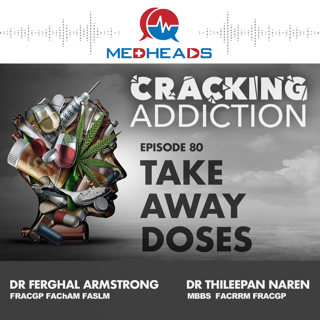
Patient Perspective and Concerns Regarding Take Away Doses
In this episode, the focus is on the complicated issue of "takeaway doses" in opioid substitution therapy. Opioid substitution therapy is a treatment program that aims to help people overcome opioid addiction by substituting their drug of abuse with a safer and more controlled opioid, such as methadone or buprenorphine.One aspect of opioid substitution therapy is the use of "takeaway doses." This refers to the provision of extra doses of the opioid substitute to patients, which they can take away from the clinic for later use in case of emergency or unexpected circumstances. However, the use of take away doses raises several concerns from a clinical safety perspective, as there is always a risk of patients misusing or diverting the extra medication.In this episode of "Cracking Addiction," the topic of take away doses is thoroughly explored, with a focus on balancing the clinical safety concerns with the needs and requirements of patients. The criteria for takeaway doses, such as the patients' stability and progress in treatment, are discussed. Additionally, the contraindications to take away doses, such as recent drug use or a history of non-adherence, are also discussed.Finally, the show explores the patient's perspective and concerns with regards to takeaway doses. Patients may have concerns about the security and safety of their extra medication, as well as their own ability to resist the temptation to misuse it. By addressing these concerns and discussing the pros and cons of take away doses, "Cracking Addiction" aims to provide a comprehensive and balanced examination of this complex and controversial aspect of opioid substitution therapy.Discussions and comments in our videos are for informational purposes only and should not replace the advice of your medical professional. Please consult with your doctor before making any changes to your medical treatment or lifestyle.Latest Blogshttps://www.meducate.com.au/blogAbout Meducate ®Meducate provides online education for doctors, clinicians, health professionals and the public.See the website to browse the many different talks and courses available https://www.meducate.com.au
22 Helmi 202319min
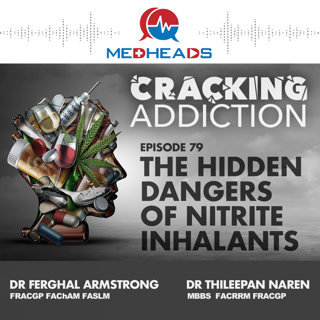
The Hidden Dangers of Nitrite Inhalants
Inhalant Abuse: Understanding the Dangers of Hydrocarbon and Nitrite Inhalation - Hydrocarbon inhalants are substances that are inhaled for their intoxicating effects. They include a wide range of products, such as gasoline, paint thinner, glue, and aerosol sprays. These substances are commonly abused by inhaling the fumes, which can produce a feeling of euphoria and relaxation. However, inhaling hydrocarbon fumes can be extremely dangerous and can lead to a number of negative health effects, including respiratory problems, brain damage, and even death. Additionally, inhaling these substances can also be highly flammable and can lead to fires and explosions. It is important to avoid inhaling hydrocarbon fumes and to seek help if you or someone you know is struggling with addiction to these substances. Additionally we discuss nitrites which are vasodilators and can create a warm rush and sensation of warmth and also can be used as a chemsex drug which can cause anal sphincter relaxation. Side effects can include headaches, hypotension, methaemoglobinaemia and can cause burns if nititres are exposed to a flame.Discussions and comments in our videos are for informational purposes only and should not replace the advice of your medical professional. Please consult with your doctor before making any changes to your medical treatment or lifestyle.Latest Blogshttps://www.meducate.com.au/blogAbout Meducate ®Meducate provides online education for doctors, clinicians, health professionals and the public.See the website to browse the many different talks and courses available https://www.meducate.com.au
15 Helmi 202319min

Medicinal Cannabis Today : Indications and Evidence Pt2
Medicinal Cannabis Part 2 – In this episode of Cracking Addiction, Dr. Jim Connel joins us again and we discuss the side effects of cannabis, in particular psychiatric side effects, harms that may be associated with medicinal cannabis, the current regulations with regard to driving and medicinal cannabis, the experiences in other countries where medicinal cannabis has a longer history than in Australia, predictions with regard to the future role of medicinal cannabis, and potential roles of medicinal cannabis in addiction medicine. Discussions and comments in our videos are for informational purposes only and should not replace the advice of your medical professional. Please consult with your doctor before making any changes to your medical treatment or lifestyle. Latest Blogs https://www.meducate.com.au/blogs About Meducate ® Meducate provides online education for doctors, clinicians, health professionals and the public. See the website to browse the many different talks and courses available https://www.meducate.com.au
8 Helmi 202316min

Medicinal Cannabis Today : Indications and Evidence Pt1
Medicinal Cannabis Part 1– In this episode of Cracking Addiction, we are joined by Dr. Jim Connell, a GP and medicinal cannabis prescriber and the founder and chief medical officer of Heyday Medical. In this episode of Cracking Addiction, we discuss the endocannabinoid system, cannabis, and the cannabinoids that comprise cannabis, the history of medicinal cannabis, the current indications for medicinal cannabis, the evidence for cannabis for anxiety, depression, chronic pain, and sleep, and whether there is a role or any evidence for medicinal cannabis as an opioid-sparing agent, as well as how to select patients appropriately for a trial of medicinal cannabis.Discussions and comments in our videos are for informational purposes only and should not replace the advice of your medical professional. Please consult with your doctor before making any changes to your medical treatment or lifestyle.Latest Blogshttps://www.meducate.com.au/blogAbout Meducate ®Meducate provides online education for doctors, clinicians, health professionals and the public.See the website to browse the many different talks and courses available https://www.meducate.com.au
1 Helmi 202318min
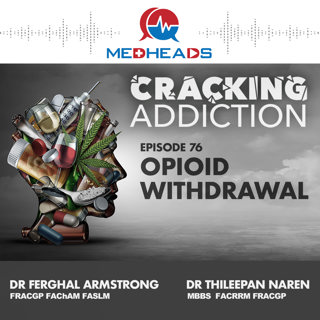
Navigating the Challenges of Opioid Withdrawal: Tips and Strategies
The distress that individuals undergoing opioid withdrawal can experience can range from mild to severe, depending on the type and duration of opioid use, as well as the individual's overall physical and mental health. Different opioids can cause slightly different withdrawal symptoms, which can include physical symptoms such as muscle aches, sweating, and insomnia, as well as psychological symptoms such as anxiety, depression, and irritability.One of the most challenging aspects of opioid withdrawal is the phenomena of precipitated withdrawal, which occurs when an individual is given a medication that binds to the same receptors as the opioid they are dependent on, which can cause an intense and sudden onset of withdrawal symptoms. Precipitated withdrawal can be incredibly distressing, and it is important for individuals to be aware of this potential outcome if they are considering using medications to help manage their withdrawal symptoms.Managing the symptoms of opioid withdrawal can be a complex process, and it is important for individuals to work with medical professionals to develop a plan that is tailored to their specific needs. This may include the use of medications such as methadone or buprenorphine to help ease withdrawal symptoms, as well as counseling and support services to address the psychological aspects of addiction.It is important to note that an isolated opioid withdrawal without a plan for using opioid substitution therapy can increase the risk of relapse and overdose. When an individual is no longer opioid tolerant post opioid withdrawal, they are at a higher risk of an overdose if they do relapse, which is why it is essential to have a plan in place for opioid substitution therapy and ongoing support for addiction recovery.In summary, opioid withdrawal is a complex and challenging process that can cause a range of physical and psychological symptoms. Precipitated withdrawal can be particularly distressing, and it is important to work with medical professionals to develop an individualized plan for managing withdrawal symptoms. Additionally, it is important to have a plan for opioid substitution therapy and ongoing support for addiction recovery to avoid the risks of relapse and opioid overdose.Opioid withdrawal is a complex phenomenon.Discussions and comments in our videos are for informational purposes only and should not replace the advice of your medical professional. Please consult with your doctor before making any changes to your medical treatment or lifestyle.Latest Blogshttps://www.meducate.com.au/blogAbout Meducate ®Meducate provides online education for doctors, clinicians, health professionals and the public.See the website to browse the many different talks and courses available https://www.meducate.com.au
25 Tammi 202325min
